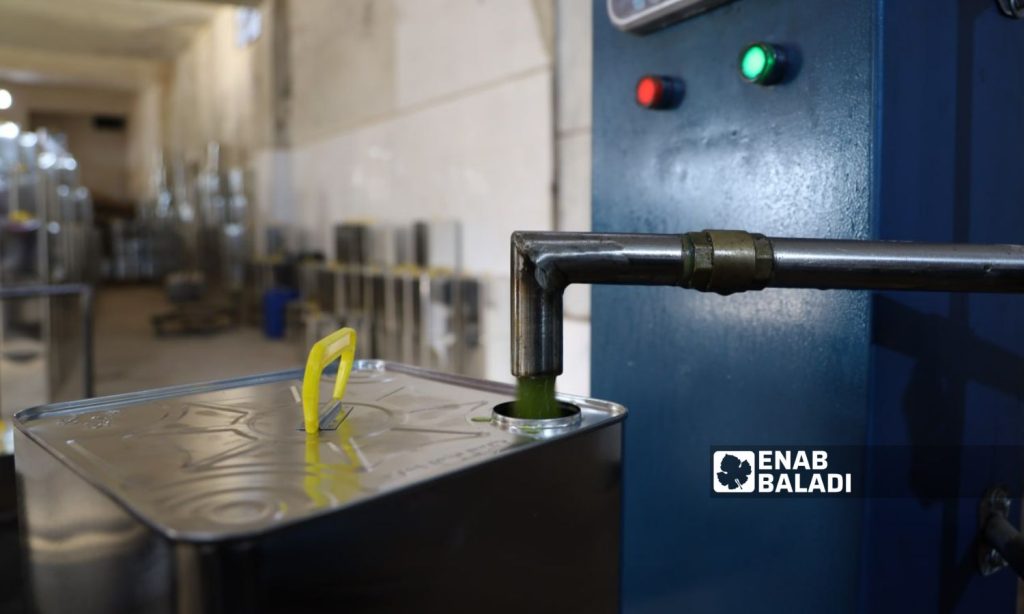Latakia – Linda Ali
The 39-year-old Hussein paid about a third of his government salary to be able to buy a liter of olive oil at a price of 41,000 Syrian pounds, which is not sufficient for his family, who live in the countryside of coastal Jableh city, for more than 20 days under normal circumstances.
The supply of oil has become a thing of the past, Hussein says, adding that he produced from his land this year about three jerrycans of oil, each with a capacity of 20 liters. His mother and sister had a third of the quantity and the rest he used with his five family members.
The price of olive oil has recently increased dramatically, sometimes exceeding 750,000 SYP for a twenty-liter jerrycan, according to its quality and the law of supply and demand, in most regime-held areas, especially in Latakia, the home of Syrian olive cultivation with around one million trees, extending over an area of 45,000 hectares.
Hussein indicated that he used to buy the entire supply of oil during the season from presses or neighbors, but he could not secure the price for it this year.
With the recent increase in the price of olive oil, the man began to buy by the liter and recommended to his wife to “rationalize,” adding, “Very soon, the oil and thyme sandwich will become a dream.” (Thyme and olive oil is a traditional breakfast meal)
Trickery to save
Afaf, 42, of Latakia city, resorts to a little trickery, as she buys a liter of olive oil at a price of 41,000 Syrian pounds and a liter of sunflower oil at a price of 18,000 Syrian pounds, and mixes the two types, thus saving the price of about half a liter of olive oil.
Afaf revealed her fears that she would not be able to buy olive oil if it continues to rise and said that she decided not to buy thyme to “rationalize” oil consumption, especially since the summer season has begun, and almost all of its food is cooked with olive oil, such as beans, cowpeas, and others.
Iraqi merchant
The high price of oil was not surprising, according to Ali, 34, of Jableh countryside. He said that about a month ago, some people started buying olive oil in large quantities, and when he asked about the reason, they told him that an Iraqi merchant wanted to buy a large amount of it to export to Iraq.
Ali added that the merchant’s intermediaries paid 400,000 Syrian pounds for a 20-liter jerrycan, which was sold a few weeks ago for about 250,000 SYP at the maximum, pointing out that he sold them five jerrycans of oil, expressing his great regret, as he lost a lot.
A number of Latakia residents interviewed by Enab Baladi expect that the price of olive oil will continue to rise and that the price of one jerrycan will reach about one million Syrian pounds due to several combined factors, namely allowing exports and monopolization, in addition to expectations of a lack of production this season.
The head of the Peasants’ Union in Latakia, Adeeb Mahfoud, told the local al-Watan newspaper on June 21 that a large number of merchants bought olive oil last season at a price ranging between 250,000 and 300,000 pounds for a single jerrycan, and stored it to benefit from it in such circumstances from the increased demand for the substance, which made the price rise.
Export of a strategic commodity
In October 2022, the regime government allowed the export of olive oil and announced its agreement to export 45,000 tons of oil out of a production volume of about 200,000 tons. The decision sparked widespread controversy and numerous criticisms.
The Minister of Agriculture, Mohammed Hassan Qatana, considered that the decision to allow the export of olive oil came due to the decrease in the purchasing power of the citizen, who now buys small quantities, which are surplus quantities in the markets.
Al-Watan newspaper quoted Qatana as saying that the decision allows the export of 45,000 tons of olive oil, whether from stored production or from the new season.
A source in the Peasants Union in Latakia, who preferred not to be named, told Enab Baladi that the government should have stored the oil and put it out through halls belonging to its institutions and sold it at cost price, instead of allowing it to be exported, which led to a significant increase in its price.
The head of the Peasants Union in Latakia attributed the high price of olive oil to export and monopoly, and everyone knowing that the next season will not be good in terms of production.
Syria ranked fourth in the world among olive oil-producing countries from 2004 to 2008, dropping to seventh place in 2018.
Government officials invoke sanctions and war, while one of the main reasons is the difficulty of farmers securing agricultural requirements and the lack of support.
According to the Salary Explorer website, which specializes in salary and wage scale numbers around the world, the average monthly salary in Syria during 2022 amounted to about 146,000 Syrian pounds, and 50% of the employees had an average salary of 146,000 pounds or less, while the other half earned more than that.

